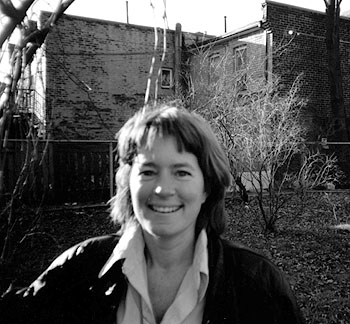 |
| www.library.ns.ca/.../index_2002/dissv9n10.htm |
Deborah Ellis is an author. She was born on August 8, 1960 in Cochrane, Ontario, and she now works in Toronto, Ontario as a mental health worker at a women's shelter. She has known that writing was what she wanted to do since she was 11 years old. She is my hero because of the kinds of books she writes. She covers topics that most people would rather not even think about. The thing is she doesn't just write about these things, she actually visits the countries that are featured in her stories. Although most of her stories are fiction, they are about children who are so believable that they could be real.
She has visited Afghanistan, and she has volunteered in a refugee camp in Pakistan. She has spent time talking to people, especially women, about their lives and their experiences during the Taliban's 5-year rule in Afghanistan. The first story she set in Afghanistan is about a young girl named Parvana who has to disguise herself as a boy and go to work in the often deadly streets of the Kabul market so that she can feed her family after her father is arrested. The second book in this trilogy is called Parvana's Journey, and it tells about her search for her family through the hills and refugee camps of Afghanistan. The final book, Mud City, is about Parvana's best friend Shauzia, and her life as she attempts to reach the far off fields of France.
Deborah Ellis has also compiled a book of stories that she was told by children in Israel and Palestine about how their lives are affected by the war between the two countries. She has also been to Africa where she gathered stories of children who have been affected by the AIDS epidemic, and used these stories to publish a non-fiction book called Our Stories, Our Songs. She also used this experience to write a fictional story called The Heaven Shop, which is about a young African girl named Binti.
Deborah Ellis tells stories that are about really terrible experiences in a way that young people can understand, by writing about young people who are easy to identify with, lovable and believable, despite their unbelievable but true situations and stories. I think that it is great for young people to be able to learn about people their own age who are suffering so far away. If more people read books like this, maybe they will begin to see things in a way that is bigger than themselves. I think that these books could motivate many people to help those who are worse off than themselves.
In grade 5 we had to write and present speeches to the class. The Breadwinner Trilogy inspired me to do my speech on the situation for women and girls in Afghanistan. After reading Deborah Ellis' books, I have also attended several talks on Afghanistan, and I attribute my interest in this subject to her books. The royalties from her books are donated to organizations that are helping the types of children she writes about. Because she doesn't just write about some poor miserable children far way, but actually takes the time to visit the countries they come from and paints the pictures of hope and effort that are behind the tragedy, I think she can reach many more people. She manages to connect us with everyone, people we would never even have thought about, if we weren't introduced to them in books like hers.
Deborah Ellis has started to bridge the gap between people from different cultures. By doing this in a way that is interesting, she has enabled young readers to see outside of themselves, to see people their own age suffering in ways that they could not begin to imagine. At the same time, it doesn't seem like she is trying to scare you, just open your eyes.
Page created on 3/10/2008 12:00:00 AM
Last edited 1/6/2017 10:48:17 PM
